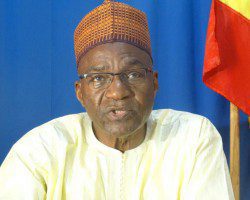The president of the Chadian transition had announced the formation of a government of national unity led by a veteran opposition figure.
The decree appointing Saleh Kebzabo as prime minister was read on state television by the Minister of State, Secretary General of the Presidency, Gali Gatta Ngoté earlier on Wednesday.
The leader of the National Union for Democracy and Renewal (UNDR) is the choice of General Mahamat Idriss Deby Itno, who was appointed president of the transition on Saturday 8 October at the end of the National Sovereign Inclusive Dialogue (DNIS).
In his inaugural speech on Monday 10 October, the Chadian head of state announced the imminent formation of a government of national unity.
By appointing Kebzabo to head the first government of the second phase of the transition, Mahamat Idriss Deby Itno seems to want to make this wish a reality, even if the DNIS was boycotted by part of the opposition and the Front for Change and Concord in Chad (Fact), blamed for the assassination of his father Marshal Idriss Deby in the north of the country.
The late president was leading a counter-offensive against the rebel movement.
His son Mahamat, appointed head of a military transition committee by fifteen army generals promised an 18-month transition.
But last June, he changed his mind and entrusted his presidential destiny to ”the will of God”.
At the end of the DNIS which held in N’Djamena last August, the 37-year-old general obtained the nod to extend the transition by two years, but also to run for the next presidential elections, raising fears of sanctions against Chad.
The African Union (AU) had urged the junta to respect “the eighteen-month period for the completion of the transition.”
The European Union (EU) has also expressed its “concern” after the decision adopted Saturday by the DNIS delegates to extend the transition and allow General Mahamat Idriss Deby to run for the presidency.
But for its Prime Minister, who was one of Marshal Idriss Deby’s opponents, “Chad cannot be sanctioned” because the circumstances are totally different, referring to the anti-constitutional changes that took place in Mali in August 2020 and May 2021 and also in Guinea in September 2021.
AC/lb/as/APA


